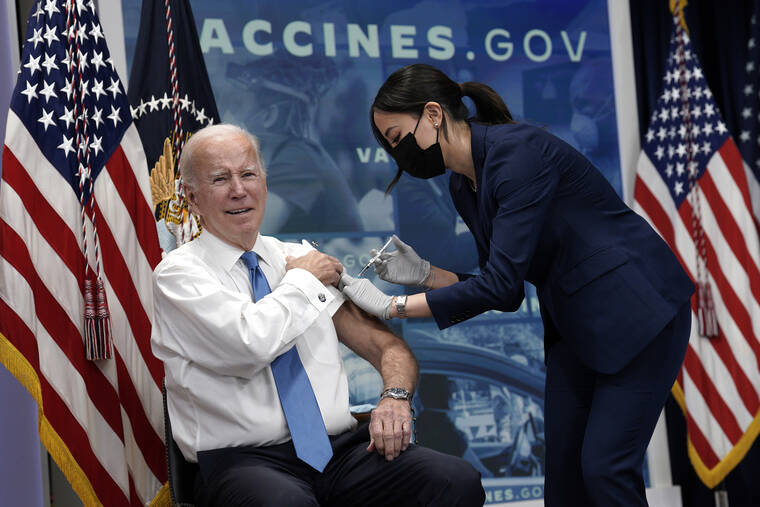WASHINGTON — President Joe Biden is urging a vaccination push as he braces for a winter wave of COVID-19 cases that could again drive up hospitalizations and deaths, but this time without a blank check to fight the surge.
Congressional Republicans have blocked more funding for vaccines and treatments, forcing the government to scrounge what money it can for those and to lean on the private sector for care. That’s raised questions about whether stocks of tests, vaccines and Pfizer Inc.’s Paxlovid treatment pills will last.
Biden, hampered by an increasingly shoestring budget, is enlisting U.S. businesses to elevate booster uptake as vaccine coverage dwindles, other treatments grow obsolete and low supplies run out.
The president was joined at the White House Tuesday by executives from CVS Health Corp., Rite Aid Corp. and Walgreens Boots Alliance Inc. Biden, who received his own booster, asked employers to host on-site clinics for flu and coronavirus vaccines, email workers urging them to get shots, and offer paid time off for employees with side effects.
“As a country we have a choice to make,” said Biden, urging people to get updated boosters. “Can we repeat what happened in the past winters — more infections, more hospitalizations, more loved ones getting sick, even dying from the virus? Or can we have a much better winter, if we use all, all the tools we have available to us now?”
In addition to a lack of funding, the administration also faces widespread public apathy, with masking and distancing almost entirely abandoned across the country. Biden himself declared last month the pandemic was “over,” and virtually never wears a mask, even among crowds of his supporters. The U.S. has also largely abandoned COVID-specific press briefings.
Hospitalizations have now begun to rise in some European countries and areas of the U.S., as new versions of the virus, such as the XBB variant, become better able to evade immunity from vaccines or previous infections.
Biden again on Tuesday urged Congress to “step up with much needed COVID funding.”
“Help us stay ahead of the virus,” he said.
“My message to Congress is that we must pass more COVID funding,” said Lawrence Gostin, director of the O’Neill Institute for National and Global Health Law at Georgetown University. “COVID isn’t over and, we are going to see many more American deaths unless Congress acts and the public understands the importance of vaccinations.”
Roughly 20 million people have so far gotten an updated booster, with numbers picking up since the shots were authorized early last month.
Still, the administration wants higher vaccination numbers and expects a spike in cases driven by cooler weather and holiday gatherings, an official familiar with their plans said, speaking on condition of anonymity.
A winter wave could also bring testing shortages. Biden’s team is working to build stockpiles and is in touch with retailers, warning them to not be caught flat-footed. It’s too soon to say whether pharmacies and others have bought enough tests for winter, the official said.
Aside from vaccines, the U.S. has relied on Paxlovid to minimize severe cases. Supplies remain strong, but it’s not clear that will last all winter, the official said. It’s also unclear whether the U.S. would be able to buy any more — which may force the drug’s transition to the commercial market, likely reducing use.
“It is going to cost money to get a shot or to get Paxlovid or other treatments. That will mean the U.S. will fall even further behind our peers,” Gostin said.
The U.S. needs to develop vaccines and treatments that are more resilient to variants, and that won’t happen without new funding, the official said.
“Our vaccine campaign funds are very, very limited and that has definitely made it harder to get people vaccinated and to run a real campaign,” Biden’s COVID-19 response coordinator, Ashish Jha, said last week during a Georgetown panel discussion hosted by Gostin.
Monoclonal and pre-exposure treatments are proving less effective at countering new variants and may soon be rendered ineffective, Jha said. “Our medicine cabinet — which should be getting bigger as we go further along in this disease — is actually getting smaller.”
The administration has been preparing broadly for the potential turnover of senior figures after the Nov. 8 midterm elections, but the COVID-19 team is poised to remain largely intact.
Anthony Fauci, the famed immunologist, is retiring, including from his role as Biden’s chief medical adviser.
Health and Human Services Secretary Xavier Becerra and Centers for Disease Control and Prevention Director Rochelle Walensky, meanwhile, have indicated they plan to remain in their roles, saying that — between COVID-19 and other priorities — ample work remains.
Biden on Tuesday urged employers to adopt generous and flexible vaccination and sick-leave plans, even as the administration contends the worst of the virus is over.
Biden heralded a program Walgreens is expected to launch that would allow Americans living in areas designated by the government as “socially vulnerable” to have online Paxlovid prescriptions delivered for free by Uber Inc. and DoorDash Inc. drivers.
But it’s unclear if those initiatives will be enough with dwindling vaccines and Paxlovid as the entire U.S. defense.
“The U.S. has one of the worst vaccination rates among high-income countries of the world,” Gostin said. “That means we will continue to have relatively higher rates of hospitalization and death.”



